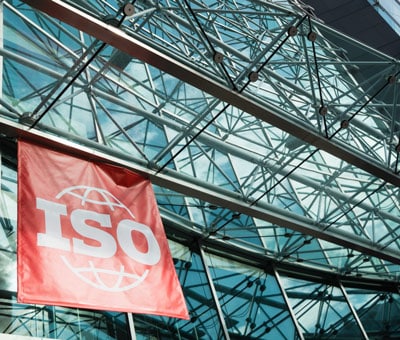ISO celebrates its 70th anniversary
The ISO story began in 1946. In the post-war period, the founding members saw international standards as the key to rebuilding the world. One year later, on February 23, 1947, ISO officially came into being when it began operations at the Central Secretariat in Geneva.

The history of ISO began in 1946 when delegates from 25 countries gathered in London to discuss the future of standardization. The then Austrian Standards Institute (ASI) and the Swiss Standards Association were founding members. The purpose of the young organization was to facilitate the coordination and standardization of the standards developed by its member organizations.
The International Organization for Standardization (ISO for short, from the Greek ἴσος isos, German 'gleich') is the international association of standardization organizations and develops international standards in all fields except electrics and electronics, for which the International Electrotechnical Commission (IEC) is responsible, and except telecommunications, for which the International Telecommunication Union (ITU) is responsible.
These founding principles still apply today. The ISO family now has 163 members from almost every country in the world. Standardization has come a long way and ISO International Standards, which now cover almost all aspects of technology and business, will continue to ensure positive change in an evolving world.
Historical standards
After the organization was founded, 67 expert groups (technical committees) were set up in specific technical fields such as screw threads, marine technology, foodstuffs, textiles, varnishes and laboratory equipment with a mandate to develop international standards. This led in 1951 to the first ISO standard (then called "recommendations"), ISO / R1: 1951, the standard reference temperature for industrial length measurements.
Since then, the ISO portfolio has expanded to include over 22,000 standards that support all the major technological, environmental and social changes that have taken place in the world.
"For 70 years, ISO has made standards that have shaped our history and accompanied the world's greatest innovations. From the standardization of materials, components and equipment for the aerospace industry to the measurement of environmental pollutants, from the establishment of a management system to ensure food safety in the supply chain to the creation of guidelines for human-robot interaction, the need for international standardization has always been developed with the needs of industry and society ", says ISO President Dr. Zhang Xiaogang.
Expansion of the community
ISO has worked hard over the years to broaden its stakeholder base with organizations and users in developing countries, for example.
Societal parameters such as improved satisfaction and greater safety for consumers provide key specifications for standards. The inclusion of social insights in standards development is therefore essential, as these real-world perspectives help to ensure that issues such as quality and safety are adequately addressed. The importance of consumer protection thus received support with the ISO Committee on Consumer Policy (ISO / COPOLCO) as early as 1978.
With regard to current developments, standards will remain important in order to be able to regulate climate change or water scarcity across national borders, or to manage cyber security or human migration in order to optimise international action and integrated management.
Many evidenced points have recently been adopted by the United Nations as part of its 2030 Agenda for Sustainable Development, cf. 17 Sustainable Development Goals (SDGs).
"The ISO community has many standards that can help organizations and companies address their agenda," says the ISO president. "We are ready to provide efficient tools to help different communities around the world address these challenges."









